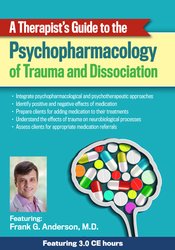

Let’s face it – treating trauma is hard work and it’s not always clear what needs to be done. Dysregulated nervous systems, co-morbidities, and a myriad of psychotherapeutic and psychopharmacological options often make it difficult to reach the desired goals for your clients.
Even though you may not be a prescriber of medications, it’s essential that you have a thorough understanding of the effects medication has in treating trauma.
Watch world renowned trauma expert Frank Guastella Anderson, MD, in this recording as he guides you through the essentials of Psychopharmacology related to the treatment of Trauma and Dissociation.
Dr. Anderson will teach you how to:
Improve your outcomes through the understanding and application of the interplay between medications, psychotherapy and trauma.
This online program is worth 3.0 hours CPD.
| File type | File name | Number of pages | |
|---|---|---|---|
| Manual - A Therapist's Guide to Psychopharmacology of Trauma and Dissociation (739.5 KB) | 43 Pages | Available after Purchase | |
| Manual - A Therapist's Guide to Psychopharmacology of Trauma and Dissociation - French (739.5 KB) | 43 Pages | Available after Purchase | |
| Manual - A Therapist's Guide to Psychopharmacology of Trauma and Dissociation - Italian (739.5 KB) | 43 Pages | Available after Purchase |

Frank Anderson, MD, completed his residency and was a clinical instructor in psychiatry at Harvard Medical School. He is both a psychiatrist and psychotherapist. He specializes in the treatment of trauma and dissociation and is passionate about teaching brain-based psychotherapy and integrating current neuroscience knowledge with the IFS model of therapy.
Dr. Anderson is a lead trainer at the IFS Institute with Richard Schwartz and maintains a long affiliation with, and trains for, Bessel van der Kolk’s Trauma Center. He serves as an advisor to the International Association of Trauma Professionals (IATP) and was the former chair and director of the Foundation for Self-Leadership.
Dr. Anderson has lectured extensively on the Neurobiology of PTSD and Dissociation and wrote the chapter “Who’s Taking What” Connecting Neuroscience, Psychopharmacology and Internal Family Systems for Trauma in Internal Family Systems Therapy – New Dimensions. He co-authored a chapter on What IFS Brings to Trauma Treatment in Innovations and Elaborations in Internal Family Systems Therapy, and recently co-authored Internal Family Systems Skills Training Manual.
His most recent book, entitled Transcending Trauma: Healing Complex PTSD with Internal Family Systems was released on May 19, 2021.
His memoir, To Be Loved, is set to be released on May 7, 2024.
Speaker Disclosures:
Financial: Dr. Frank Anderson maintains a private practice. He is the Executive Director of the Foundation for Self Leadership and has employment relationships with The Trauma Center and The Center for Self Leadership. Dr. Anderson receives royalties as a published author. He receives a speaking honorarium, recording, and book royalties from PESI, Inc. He has no relevant financial relationships with ineligible organizations.
Non-financial: Dr. Frank Anderson is a member of the New England Society Studying Trauma and Dissociation and the International Society for the Study of Trauma and Dissociation.
| 5 |
|
| 4 |
|
| 3 |
|
| 2 |
|
| 1 |
|
Satisfaction Guarantee
Your satisfaction is our goal and our guarantee. Concerns should be addressed to info@pesi.co.uk or call 01235847393.
Please wait ...